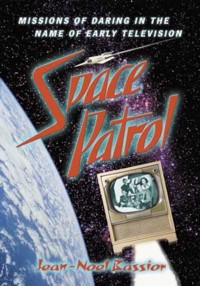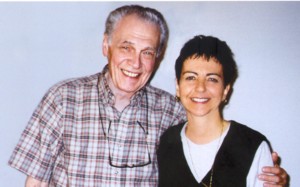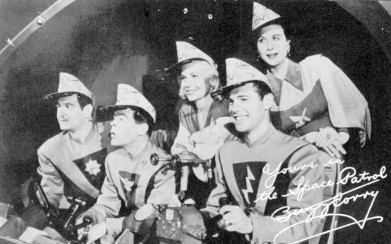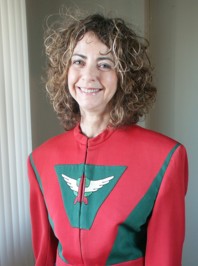|
|
The Thunder Child: An Interview With Jean-Noel Bassior
 Space Patrol: Missions of Daring in the Name of Early Television
Space Patrol: Missions of Daring in the Name of Early Television |
Writing Space Patrol
This page features a behind-the-scenes look at the research and writing of Space Patrol: Missions of Daring in the Name of Early Television. The Biography and General Questions page details Jean-Noel's careers as a musician and journalist.
(Be sure to check out her website for the book, spacepatrolbook.com, created by Paul Holbrook. It has lots of good stuff that you'll enjoy!)
You researched the book for 20 years. How long did it take you to actually write it?
It took three years to actually write the book, but for many years before that, I was gathering information, doing interviews - and not writing. I had boxes of notes, tapes, transcripts, photos, newspapers and magazines from the 1950s stacked high, along with plenty of guilt and procrastination.
|
| Ironically, I'd become a freelance journalist to pursue the Space Patrol story, but my new career kept me so busy that (I'm embarrassed to say) the book got shoved aside for months on end. In the meantime, people I really wanted to interview passed away, like technical director Irwin Stanton.
Even though I wasn't actively working on the book, I did try to interest a publisher, and in 1998, McFarland, known for its books on classic TV and film, accepted the project. They gave me a deadline of July 2000, but I blew right through it. I was still living from assignment to assignment with no time to stop, starve and write a book. Steve Wilson, the acquisitions editor, was patient and never pressured me. I think I realized that once I really committed to writing the book, my life as I knew it would end, and I'd drop into a black hole for years (which is exactly what happened). I remember having this sinking feeling one day - as I shoved the damn Space Patrol boxes out of my way yet again - that there would never be time to write the book, and that I was going to let a lot of people down who'd given me interviews and trusted me with their memories.
Then, magically, Virginia Bach, wife of famed Word-a-Day cartoonist Mickey Bach, came into my life, insisting I write the book - and gave me the money to start. No more excuses. I still had to take some assignments as a journalist, but thanks to Virginia, there were weeks when I could focus on the book, track down people I needed to interview, and just write, write, write. Virginia, then in her 90s, had not been a Space Patrol fan, but she was in love with the 1950s, when she'd been in her prime and danced the night away at Ciro's and Mocambo - trendy clubs on the Sunset Strip where Space Patrol actors Lyn Osborn and Virginia Hewitt hung out. Bach had met Hewitt briefly, after she'd retired from acting. It was Virginia Bach who made the Space Patrol book possible.
|
Suggested Links
TTC review of Space Patrol, by Jean-Noel Bassior
Jean-Noel Bassior's website: The Space Patrol Book
Space Patrol website at The Solar Guard
Jean-Noel Bassior's memories of Ed Kemmer at the Space Patrol/Solar Guard site.
Links to some interviews by Bassior
Stephen Greer (Hustler Magazine)
Michael Feinstein (AARP The Magazine)
Eileen Collins (AARP The Magazine)
Old Time Radio Links
SPERDVAC
Original Old Time Radio Pages
Radio Days
Magazines
Big Reel
FilmFax
|

Ed Kemmer (Buzz Corry) and Jean-Noel Bassior |
You submitted the manuscript and photographs to McFarland. . . Did you have a say
in where the book designer placed your photos, or did he/she just decide on
their own?
I had hundreds of photos to sift through, and my friends Alice Su (a professional photographer) and Nancy Heck helped a lot, but I made the final selections. McFarland set a limit of 100 photos, but I gave them over 200, with captions and detailed notes about why each one was absolutely crucial (I was crazed). In the end, a miracle happened: They used every photo I gave them.
|
Though I was the one who matched photos with text, I have to say that McFarland's art department is amazing. They blew me away with their layout and design of the book. I don't know how they did it, but, for me, there's magic in every page where a photo appears. Another surprise was the "feel" of the book. My biggest fear was that - with all those photos - it would be a coffee table tome. But somehow the wizards at McFarland produced a book that's easy to hold and read.
Did you have any discussions with McFarland about any part of the publication process, or was it all smooth sailing?
About a month after I delivered the manuscript to McFarland, a lengthy letter arrived saying they were "deeply concerned" about my tendency to "revert often to first person, describing your experiences in researching the book and interviewing people for it." The effect, they said, was to "lessen the book by making it seem overly personalized." What's more, the pages had way too much color and description. They cited a few examples of copy that should be cut::
| A soft, gray mist cradles Riverside Park, across the street from the 654-unit brick co-op apartment complex where Ed and Fran Kemmer live. The park hugs the shore of the Hudson River and the late-afternoon sun transforms the water into a glistening sheet of liquid crystal. . .
(and)
The console TV opposite [Kemmer's] easy chair was tuned to the 1984 Olympics. He later turned it down, but never off - images of athletes in their prime flickered across the screen during the entire interview. . .
|
Description like this, they said, would "weary the reader" - the book should be "straightforward, factual narrative about Space Patrol." In the immortal words of Dragnet's Joe Friday, "Just the facts, ma'am." But I'd committed an even graver error. Throughout the book, I'd inserted excerpts from scripts that eerily paralleled the lives of the actors. This device was not only "structurally unsound" (they said) but "simply bewildering." Readers would "feel cheated" by these "jarring interruptions". . . "It just doesn't work," they concluded.
Smokin' rockets! When I'd first started researching Space Patrol, the uncanny parallels between plot lines and the actors' lives was stunning. How could you ignore them? They were an integral, amazing part of the Space Patrol story. McFarland didn't see it that way, and suggested I give the manuscript "an aggressive round of revision."
I was devastated, knowing I could never do what they wanted, since it would tear the heart out of the book. Then, suddenly, everything changed. For whatever reason, the folks at McFarland made a U-turn and withdrew their "suggestions" - and from that point on, we had a happy relationship. They assigned their top editor to the project, she caught some things I really did need to fix, and the space lanes stayed clear, right up to landing. As they say on my home planet Earth, "All's well that ends well."
My second favorite show after Space Patrol is Kung Fu. I relate to the hero, "Kwai Chang Caine" |
In your introduction, you explain that Space Patrol carried a personal
message for you - Cadet Happy was the embodiment of everything you wanted to
be. Were there any other shows who had such heroes for you? Any books?
No other book or show touched me like Space Patrol, but I did (and still do) like The Lone Ranger and The Cisco Kid (both radio and television versions). My second favorite show after Space Patrol is Kung Fu. I relate to the hero, "Kwai Chang Caine," played by David Carradine (though during the show's run, I had to ignore reports of Carradine's off-screen brushes with the law). |
 |
How did you go about arranging the contents of the book? Carol and Tonga
don't get their innings until Chapter 20, so you didn't do all cast first
and then crew next...
I tried to make the book read like a novel as much as possible, and three story lines emerged. First, there's the Space Patrol story as it unfolded from 1950-55 and the saga of early live TV. Then there's the story of how I reconnected with the show in 1984 and tracked down the cast and crew. And finally, there's Ed Kemmer's story - his push-pull relationship with Space Patrol and "Buzz Corry," right up to the end of his life. |
That last theme hit me when I saw the movie My Favorite Year. It blew me away. Just as some episodes of Space Patrol eerily echo the lives of the actors, that movie echoes my life. In the film, a junior writer who works on a 1950s TV show meets the actor who was his childhood hero and tries to make him understand his impact. As I watched, I realized that I was the real-life counterpart of the writer in the film - for two decades, I'd been trying to make Ed Kemmer understand the same thing. The circumstances were a bit different, since I'd approached him as a journalist, not a fan -and yet Kemmer knew that I spoke for a generation of ex-kids whose lives he'd touched. Ironically, I finally got him to glimpse his impact by quoting passages from My Favorite Year. I remember the moment when he finally let it in, then said slowly, "If that's true, then Space Patrol is obviously the most valuable thing I've done as an actor." No kidding.
| How many drafts of the book did you need? Are you one of those writers who can write best first time, or did you do a lot of polishing?
Writing is rewriting, so each chapter went through countless drafts, and the completed manuscript went through three more. It's the same when I write for magazines " I'm constantly rewriting. That said, I'm a big believer in throwing mud at the wall when you first start writing, instead of trying to get it perfect, organized, or even linear. What works for me is letting the first draft pour out without judging it; once you've got something down, you can work with it - add, subtract, edit, experiment, rewrite. I've also learned to write the most exciting part of the story first - the part that hooks me most - and often that means starting in the middle. Sometimes you don't know the lead until you've written most of the story; and if you write the ending before you get there, a driving force pushes you over the finish line. |
I've also learned to write the most exciting part of the story first - the part that hooks me most - and often that means starting in the middle. |
Of course, the enormous amount of research I'd gathered for the book presented huge organizational challenges. I spent much time creating hundreds of index cards keyed to notes, interview transcripts, news stories and other research materials. After I'd planned a chapter, I'd arrange the cards in order - they were coded to guide me to the source material I'd need. Hope that makes sense. Index cards solve many problems: You can use them to organize a chapter, book, screenplay - anything. They help you plan structure, and if you get a creative flash and decide to change things around, you can toss them in the air and start all over again. They're a great organizational tool for a project like this with thousands of moving parts.
Are there any questions about the writing of the book that I haven't
asked you that you would like to address?
It was about growing up as part of the first TV generation with role models we could trust. |
That's a great question! I think the most significant thing for me was realizing that the Space Patrol story was much bigger than I thought. It wasn't just about an old TV show. It was about growing up as part of the first TV generation with role models we could trust. It was about the people who worked on the early TV sound stages - many of them World War II vets bringing shows in on a wing and a prayer. It was about what happened to television: why it was like it was back then, and how it came to be what it is today. I realized, too, that my original plan to just report the Space Patrol story had changed; in fact, I'd become friends with the cast and crew, writers and director; it made sense to step into the story and take readers along with me every step of the way. |
And finally, I confess that as I got deeper and deeper into the book, it seemed as if it would never be finished. At those times, I found myself drawing strength and patience from the lessons I'd learned from the show itself - you know, not giving up, pushing forward through every obstacle. I thought often about what Ed Kemmer told me when I'd asked how he'd survived his war experience. He said it was: doing what you have to do to accomplish something you think maybe you can't.- Kemmer's problem had been staying alive. I wasn't facing anything like that, but those words gave me strength. I, too, was in the midst of a huge task that seemed like it was never going to come together or be completed - believe me, there were many days when I felt like I was doing something that maybe I really couldn't do after all.
Looking back, I remember other things the writers, cast and crew shared about the challenges they'd faced doing a live, action-packed show with never enough rehearsal time and special effects that went south. They spoke about all the things they knew could go wrong - and did; about how scared and inadequate they felt. Somehow, they went forward anyway, and it all came together - more on blind faith than anything else. In the end, that's what helped me complete the book: it was the lessons I learned from Space Patrol itself, and from the brave, amazing people who made it happen.

© Bob Hankins
A proud standard-bearer.
|
|
Must Have!

Learn more or
Buy Now
Recommended Viewing

Learn more or
Buy Now

Learn more or
Buy Now

Learn more or
Buy Now
Recommended Listening

Learn more or
Buy Now

Learn more or
Buy Now
Recommended Reading

Learn more or
Buy Now

Learn more or
Buy Now

Learn more or
Buy Now

Learn more or
Buy Now

Learn more or
Buy Now

Learn more or
Buy Now
|













